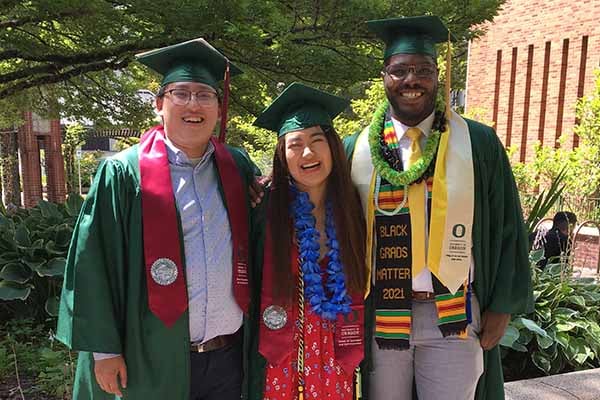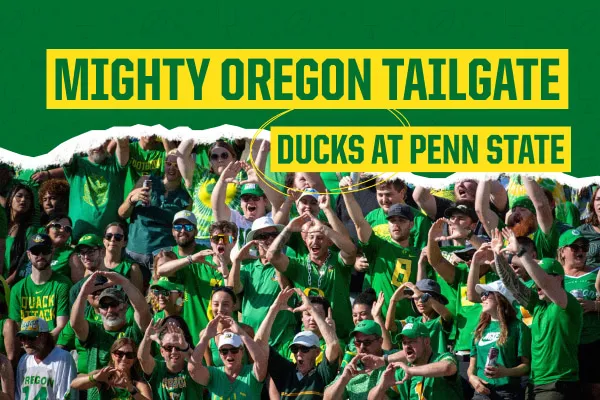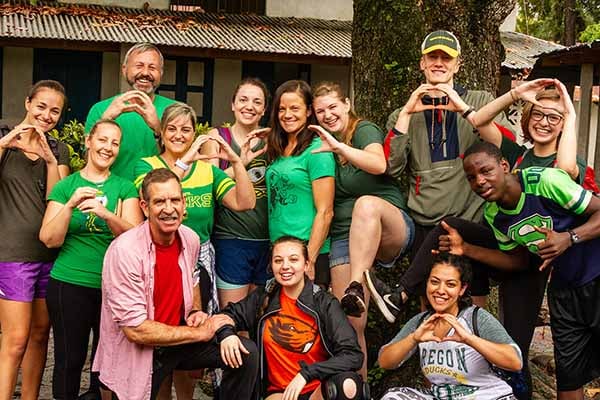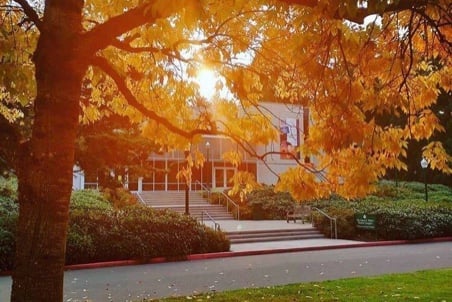July 25, 2019
Choosing a major – some say it's the most influential decision you'll make as a college student. But as the experiences of these alumni prove, your field of study may not be as important as the passion and interest your bring to your classwork and activities. And it's important to remember that your major is only the beginning of your career path.
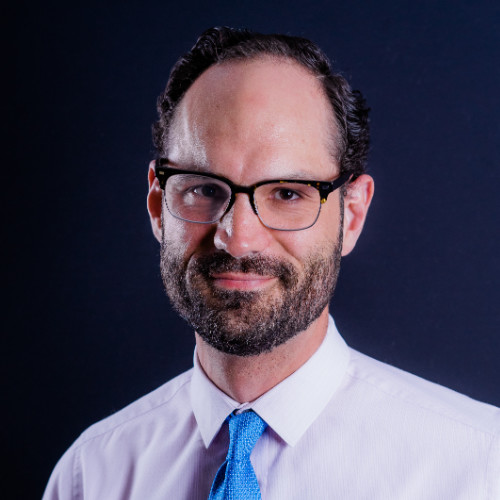
You're a business intelligence analyst at Nordstrom. What's that job like?
I work in the human resources department. A lot of what I do is answering questions that HR managers and other business managers have about HR questions. In the pursuit of answering those questions, I do a lot of data sequence and design of programming programs for software. I I also do a fair amount of coding; I'm learning how to program in the language of python. So I’m kind of a jack-of-all-trades when it comes to answering questions with data.
I actually also have a master's degree in food systems and policy, and I thought that I would go into working in the policy field, helping to make agricultural policy or local food systems policy. It turns out that jobs in that area are a little harder to come by, so I went back and did some deep thinking about what I’m good at and what I feel passionate about. I really like picking up information and looking at something from one point of view, then turning it sideways for another point of view, and then turning it back over to another side and looking at it from that point of view. That that led me into studying data. I started taking some online courses and it really just struck me, and I more or less fell in love with that. Then I applied to Nordstrom’s human resources department for a position on their data team and fortunately I got the job.
I think that's a fairly narrow story. It excludes a lot of people like me, so the thing that I got out of my time at the UO was more, as they say, “learning how to learn.” Figuring out what kinds of things, what kind of skills you can pick up to make it possible to do the other things you want to do in life. The biggest kind of mind changer I had was that I learned it's not necessarily that you go to a job and say, “Oh, I have these skills so you should hire me.” It's figuring out what skills you have that are desirable, and figuring out how to how to make those applicable to a career that you want to have. So, no matter whether you're a soft skills person or a hard skills person, no matter what industry you want to go into, there is some kind of matching there and it's possible to figure out how to sell that matching.
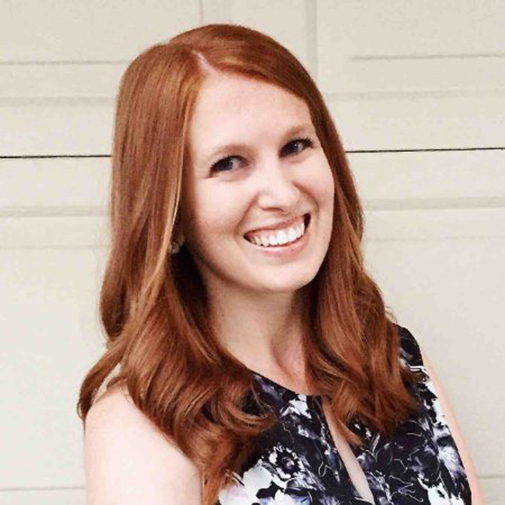
Zoe studied public relations, communication studies, and Spanish at the University of Oregon, graduating in 2008 with a degree in journalism. She stuck with the public relations path she pursued at the UO, interning at companies in Portland, Oregon, and New York City. While in New York, Zoe moved into working in development, at first in development communications, then in Advancement and Special Events. She moved to Boise, Idaho, where she now serves as Director of Major and Planned Gifts for St. Luke's Health Foundation. Learn how Zoe's passions brought her to a brand new career field.
I had an amazing college experience and loved being a student at UO. I learned a lot about what I was really interested in. You take a lot of classes in college that may be prerequisites, but may not be something you're interested in. Then you find your major and you realize there is something specific that you really like and you are passionate about.
I think that one thing I was really excited about was that my GPA had never been better until I was a junior and senior in college, taking classes I really felt excited about, and realizing I had a skill set that I didn't necessarily know that I had until I started tapping into it. It was exciting because we saw, within the journalism school specifically, people going off and doing all sorts of interesting things afterwards that weren't necessarily connected to their major.
There was a class called “Info Hell” that every journalism major had to take. You wrote a huge paper and learned how to research, and I would have never known to tap into certain things until I taken that class.
Now I'm a whiz on Google, or wherever I need to go to find what I'm looking for, because we were taught how to peel away the layers and get down to what we were truly looking for. Learning how to do this has really helped me in my current job and how I translated my PR skills into the job that I do now. We’ve had to write press releases and media alerts. We would overwrite and peel back to exactly what we specifically wanted to say and how we wanted to tell a story. Now it's really easy to come up with that 30-second elevator pitch because I got so good at using as little information as I needed to get to the point.
It was important to realize that there was a specific field of study I could excel at and be excited about that I knew would help me in my career down the road. I realized I had a great skill set that I could translate into a profession. I felt really good going out into the work world and having my school experience in my back pocket that I could pull from.
I hear a lot from young graduates that they're trying to figure out how to break into the career world and actually get a job. We had that same challenge. I was actually an intern in fashion public relations for six months, but I was interviewing for entry-level jobs and competing with people who had 10 years of experience who had been laid off. That was challenging. I knew I was the right person for the job because I had the right kind of experience, my resume looked good, and I had my college experience to pull from. I wasn't getting the job I wanted because there was someone with more experience who I was up against, and that was a really great learning experience – one I think still pertains to recent graduates today. It's about pouring out that passion, so while you may not have as much experience as the next person, you have a very recent experience to pull from, which is your college career.
So while you may not have professional experience, you have just learned these really important and essential things that will benefit you. I never felt there was a challenge in being a liberal arts major. I think it allows you to be open-minded to any sort of job opportunity because you're not specialized.
In my field there wasn’t, until recently, a major you could choose in school that would lead to non-profit and fundraising work, so my colleagues and I had all different kinds of majors: political science, finance and psychology. You have to have a certain knack for the field. Recent graduates, trying to figure out what it is they're passionate about, what makes them unique, and how they can pull from their college experience and turn that into some kind of positive, that's a strength that they have. They’re really hungry and they've just learned all of these wonderful things that they can dedicate to a job.

How did Boaz Hillebrand, BA '09, a foodie with a degree in Japanese, find happiness as a business intelligence analyst for Nordstrom?
How did you choose the University of Oregon?
I'm a native so it was not a tough decision to make to stay in-state and get that nice in-state tuition discount. I liked the culture of Eugene and the university, so it was a deciding factor for me.How did you choose your major?
Before attending the UO, I went to culinary school and had been a chef and baker for quite a while. But I always had a fairly inquisitive mind and I like to gather new data points and new information, so Japanese to me was kind of fascinating in that it was so unknown and I just gravitated towards that because every everything that I learned was a completely new context and a new thing.What did you think you might do beyond graduation?
I just assumed I would go to Japan and maybe teach English there. But that “ah-ha” moment came when I was going into my senior year and I spent a summer studying abroad there in Tokyo. I’m 6’8” and two sizes too large for the subways there. I literally had to hunch over. I thought, you know, although I'm fascinated with this culture and new experiences, there's no way I could actually live there for a sustained period of time. So, after I graduated I went back to what I had been doing before: baking and working in the culinary field.You're a business intelligence analyst at Nordstrom. What's that job like?
I work in the human resources department. A lot of what I do is answering questions that HR managers and other business managers have about HR questions. In the pursuit of answering those questions, I do a lot of data sequence and design of programming programs for software. I I also do a fair amount of coding; I'm learning how to program in the language of python. So I’m kind of a jack-of-all-trades when it comes to answering questions with data. How does your past connect to where you are now?
It's not immediately obvious. I have to backtrack a little bit. After I graduated from UO I went back to my first love of culinary and baking. I knew that I wanted to go on to graduate school, so I was thinking to myself, well, what do I want to study here? What do I think is important to me, and what do I think I could make a career out of? So I started studying in the Food Studies graduate program.I actually also have a master's degree in food systems and policy, and I thought that I would go into working in the policy field, helping to make agricultural policy or local food systems policy. It turns out that jobs in that area are a little harder to come by, so I went back and did some deep thinking about what I’m good at and what I feel passionate about. I really like picking up information and looking at something from one point of view, then turning it sideways for another point of view, and then turning it back over to another side and looking at it from that point of view. That that led me into studying data. I started taking some online courses and it really just struck me, and I more or less fell in love with that. Then I applied to Nordstrom’s human resources department for a position on their data team and fortunately I got the job.
Can you share one or two pieces of advice from your education and experience from UO?
The story often told in our culture is that you graduate from high school and you have a pretty good idea of what you want to study and what kind of career you want to have. Then you go to college and study that thing, you figure out how to do it, and then you do it for the rest of your life.I think that's a fairly narrow story. It excludes a lot of people like me, so the thing that I got out of my time at the UO was more, as they say, “learning how to learn.” Figuring out what kinds of things, what kind of skills you can pick up to make it possible to do the other things you want to do in life. The biggest kind of mind changer I had was that I learned it's not necessarily that you go to a job and say, “Oh, I have these skills so you should hire me.” It's figuring out what skills you have that are desirable, and figuring out how to how to make those applicable to a career that you want to have. So, no matter whether you're a soft skills person or a hard skills person, no matter what industry you want to go into, there is some kind of matching there and it's possible to figure out how to sell that matching.
What makes you happy and successful today, compared to what you thought it would be when you graduated?
I'm in a different job than I thought I would be in when I graduated, so that path to realizing success was not a straight one for me. I thought I would get a job somehow related to my degree in Japanese that would lead me down a path where I was working for a company in which the Japanese language was a part of their business. For a long time I felt like I wasn't succeeding; all these things I thought I had in mind for myself were not part of my life, and the change came when I was able to figure out how to do more of what I love doing. I think it sounds so trite and sort of bland, but I appreciate that every day I get to essentially do something that is fun, and that is the driver of success for me. I get to come to work and do something that I find meaningful and useful and fun, so my idea of success is to just continue doing what I do right now.What kind of Duck community do you see in Seattle? What advice do you have for Ducks who are moving to the greater Seattle area?
It’s a lot like Eugene, but bigger. There are a lot of people here very similar to the kinds of people you might meet at the UO. If you feel like you don't have a network already set up in Seattle, I would suggest social media. It’s a great thing look on LinkedIn. On Facebook you can always find people who went to the UO who are in a big city on the West Coast like Seattle. In my experience, people in Eugene and from Eugene who went to the UO are very friendly no matter where they are.
Zoe Brunelle, BA '08, now a fundraising pro in healthcare, learned vital job skills in a class called “Info Hell.”
Zoe studied public relations, communication studies, and Spanish at the University of Oregon, graduating in 2008 with a degree in journalism. She stuck with the public relations path she pursued at the UO, interning at companies in Portland, Oregon, and New York City. While in New York, Zoe moved into working in development, at first in development communications, then in Advancement and Special Events. She moved to Boise, Idaho, where she now serves as Director of Major and Planned Gifts for St. Luke's Health Foundation. Learn how Zoe's passions brought her to a brand new career field.
Deciding on a major
I went to the University of Oregon without an idea of what I wanted to study. As I was going through prerequisites my first two years, I learned about the School of Journalism and Communication. It wasn’t something that attracted me to the university in the first place, but I am the child of four English teachers, so writing, reading and learning has always been really important to me. It was an easy fit once I learned that it was an opportunity that I could access, and I had friends who were journalism majors, so it was also a social opportunity to get to hang out my friends and take classes. Then when I was choosing my focus within the journalism school, public relations seemed like an easy fit. I thought it would be a well-rounded approach and would open doors when I graduated to a lot of different things. I knew I was going to be a journalist so it was more so a question of how I could utilize what I was learning, and the skills I was getting, to do a job that might be a little less conventional in the journalism field. So I took communication studies classes to get a minor, and I took Spanish since middle school and studied abroad in Spain, so that was also a pretty easy choice for a minor.I had an amazing college experience and loved being a student at UO. I learned a lot about what I was really interested in. You take a lot of classes in college that may be prerequisites, but may not be something you're interested in. Then you find your major and you realize there is something specific that you really like and you are passionate about.
I think that one thing I was really excited about was that my GPA had never been better until I was a junior and senior in college, taking classes I really felt excited about, and realizing I had a skill set that I didn't necessarily know that I had until I started tapping into it. It was exciting because we saw, within the journalism school specifically, people going off and doing all sorts of interesting things afterwards that weren't necessarily connected to their major.
Absorb lifelong lessons
“Grammar” was a class we all had to take. That was like, “okay now, I'll never screw up any grammatical error again and I'll know exactly how to, you know, craft an email, and how to talk to people.” And what was really important, that what seemed sort of arbitrary at the time, or sort of rudimentary, ended up being really important because now we never misspell anything or misuse grammar.There was a class called “Info Hell” that every journalism major had to take. You wrote a huge paper and learned how to research, and I would have never known to tap into certain things until I taken that class.
Now I'm a whiz on Google, or wherever I need to go to find what I'm looking for, because we were taught how to peel away the layers and get down to what we were truly looking for. Learning how to do this has really helped me in my current job and how I translated my PR skills into the job that I do now. We’ve had to write press releases and media alerts. We would overwrite and peel back to exactly what we specifically wanted to say and how we wanted to tell a story. Now it's really easy to come up with that 30-second elevator pitch because I got so good at using as little information as I needed to get to the point.
It was important to realize that there was a specific field of study I could excel at and be excited about that I knew would help me in my career down the road. I realized I had a great skill set that I could translate into a profession. I felt really good going out into the work world and having my school experience in my back pocket that I could pull from.
Use your passion and experience
You take a lot of classes to graduate and some may seem kind of meaningless at the time or not pertain to you as a professional, but then you're in a job or in a job interview and you realize you still remember something a professor said. It really does help. I'm so passionate about my education and the fact that I got to learn everything that I did. My classmates and I graduated in 2008, into the recession. We had to get really creative when we were job hunting. It wasn't easy and I know that the climate today is not easy.I hear a lot from young graduates that they're trying to figure out how to break into the career world and actually get a job. We had that same challenge. I was actually an intern in fashion public relations for six months, but I was interviewing for entry-level jobs and competing with people who had 10 years of experience who had been laid off. That was challenging. I knew I was the right person for the job because I had the right kind of experience, my resume looked good, and I had my college experience to pull from. I wasn't getting the job I wanted because there was someone with more experience who I was up against, and that was a really great learning experience – one I think still pertains to recent graduates today. It's about pouring out that passion, so while you may not have as much experience as the next person, you have a very recent experience to pull from, which is your college career.
So while you may not have professional experience, you have just learned these really important and essential things that will benefit you. I never felt there was a challenge in being a liberal arts major. I think it allows you to be open-minded to any sort of job opportunity because you're not specialized.
In my field there wasn’t, until recently, a major you could choose in school that would lead to non-profit and fundraising work, so my colleagues and I had all different kinds of majors: political science, finance and psychology. You have to have a certain knack for the field. Recent graduates, trying to figure out what it is they're passionate about, what makes them unique, and how they can pull from their college experience and turn that into some kind of positive, that's a strength that they have. They’re really hungry and they've just learned all of these wonderful things that they can dedicate to a job.



